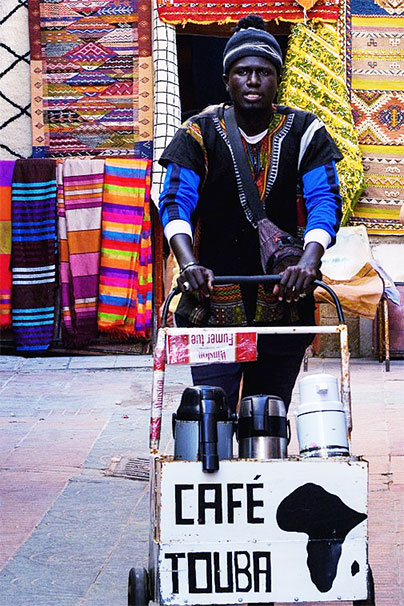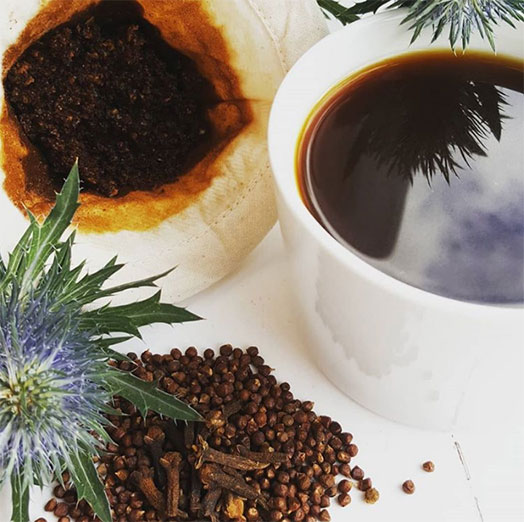A journey to the mystical past of soffee, with the senegalese Cafe Touba!

From the homeland of coffee, Africa, one of the most special and mysterious coffees of the world comes: Café Touba!
Africa, and more specifically Ethiopia, is the homeland of coffee, as coffee beans appeared for the first time in East Africa. Over the years, many African countries have developed special recipes and rituals for serving coffee. With ancient recipes that are lost in the depths of time and intense use of spices and aromas, African coffee beverages continue to surprise coffee makers even today. One of Africa's most special and well-known coffees is Café Touba from Senegal.
What exactly is Café Touba?
 Café Touba owes its name to the homonymous city of Senegal and is a coffee closely related to religious practices. When Sheikh Amadou Bamba Mbacké, founder of the Senegalese Muslim Brotherhood, returned to his homeland in 1902 after his exile in Gabon, he brought with him the habit of coffee. By sharing his beloved beverage recipe and encouraging his followers to prepare and consume coffee, he was responsible for the birth of Café Touba. Indeed, the noble Sheikh not only bequeaths the recipe of Touba to his faithful ones but also a whole ritual, which precisely defines how many prayers they have to make when preparing the coffee, serving it and enjoying their drink!
Café Touba owes its name to the homonymous city of Senegal and is a coffee closely related to religious practices. When Sheikh Amadou Bamba Mbacké, founder of the Senegalese Muslim Brotherhood, returned to his homeland in 1902 after his exile in Gabon, he brought with him the habit of coffee. By sharing his beloved beverage recipe and encouraging his followers to prepare and consume coffee, he was responsible for the birth of Café Touba. Indeed, the noble Sheikh not only bequeaths the recipe of Touba to his faithful ones but also a whole ritual, which precisely defines how many prayers they have to make when preparing the coffee, serving it and enjoying their drink!
The main difference of Café Touba lies in the use of a local Senegalese spice, Djar. Djar (or Selim Pepper or Ethiopian pepper) is a kind of long pepper that is found in sub-Saharan Africa. Particularly fragrant and delicious, Djar blends with strong African coffee in a 80:20 ratio. Traditionally, pepper is roasted along with the green coffee beans so that the fragrance unfolds and emerges in the best possible way. After roasting, the coffee is extracted in a way reminiscent of pour-over extraction and served in small cups, with no added sugar or milk.
Even today, Café Touba remains extremely popular both in his homeland, in Senegal and in neighboring African countries. Impromptu canteens sell Touba in small plastic cups, as the locals love to consume it throughout the day but also at night. Over the years, there are many who add a little sugar to their coffee, while other spices, such as cloves, are added to each area. It is worth noting that in Senegal, Touba means, in addition to the homonymous city, "happiness" - something that shows the importance of this drink to the locals.
Preparing Cafe Touba at home.
 In order to prepare Café Touba at home, it is necessary to provide Djar, which can be found at up-to-date spice shops. If, however, we are not able to supply the Senegalese spice, we can replace it with a mixture of common black pepper with cardamom and clove, in a 2:1:1 ratio, in order to reach the flavors of Djar. The total coffee to pepper ratio should be 80-20.
In order to prepare Café Touba at home, it is necessary to provide Djar, which can be found at up-to-date spice shops. If, however, we are not able to supply the Senegalese spice, we can replace it with a mixture of common black pepper with cardamom and clove, in a 2:1:1 ratio, in order to reach the flavors of Djar. The total coffee to pepper ratio should be 80-20.
Whichever spice we use, it should be roasted on low heat in order to highlight its aromas, that is why we prefer whole spices rather than ground. After roasting, we can grind our spices in a spice milling machine and then mix them with our ground coffee.
Prefer a 100% Arabica coffee, particularly aromatic - although many prefer to prepare Tuba with strong Robusta. To get closer to the tastes of Africa, it's a good idea to use some single origin African coffee, such as Illy's Monoarabica Ethiopia, Cosmai Café's Dodoma from Tanzania or Contego's Pura Energia Malawi.
The extraction of the Café Touba essentially follows the principles of filter coffee brewing. You can use a coffee maker, a French Press or any other method that is easier, but extraction with the Pour Over method is closer to the authentic process, and it also enhances the special aromas of coffee. Traditionally, Café Touba is prepared in large quantities and served in small cups - it is a coffee made to be shared and bring people closer.
If you want to turn your afternoon coffee into a special, exotic ritual, try Café Touba! Prepare your spices, put calm, African music and follow the advices of the exiled Sheikh Amadou. You do not have to pray - your coffee will definitely be very tasty.










